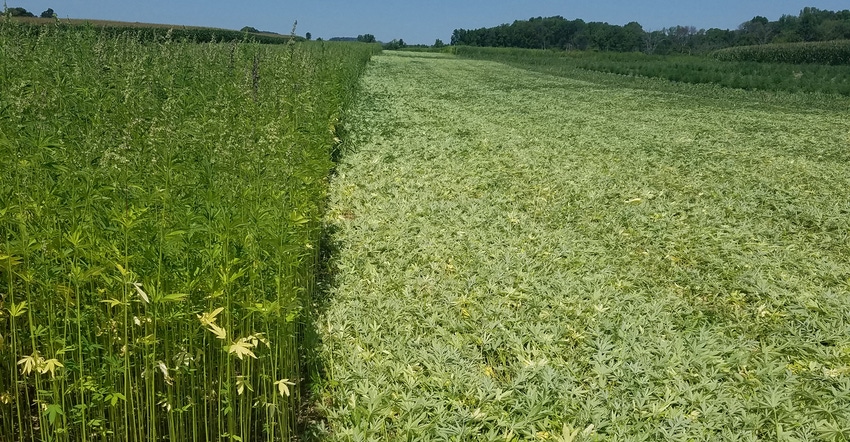
Hemp fiber processor Sunstrand officially declared bankruptcy in January. It’s no surprise to the farmers who grew for the Louisville, Ky., facility, says one such grower, Marty Mahan of Glenwood, Ind. Because hemp farming is limited to research purposes in that state, he pooled together with local farmers on a research project to find profit in cooperatively shipping their harvests over 100 miles to Sunstrand in 2019.
They never got the chance. As it became clear that Sunstrand would never buy their hemp bales, Mahan says members of the group started to look for other opportunities. One farmer sold some of their bales to a company that’s experimenting, while another is preparing to supply Kentucky-based processor HempWood.
“Some people got letters,” Mahan says, referring to Sunstrand’s bankruptcy filing. “They were saying that they have filed for Chapter 7 bankruptcy. There’s no extra money. It’s not likely you’re going to see anything. But hey, feel free to stake your claim if you want to.”
Hemp grown for fiber is much less labor intensive than when it’s grown for cannabidiol, or CBD, and Sunstrand supplied the seeds. Mahan says the only significant expense on his end was fertilizer. That wasn’t much compared to the debt he incurred pursuing hemp grown for CBD. Neither of his 2019 harvests are sold, and as of now, he doesn’t plan to grow either variety of hemp in 2020, outside of potentially a small research plot.
“I’m not growing any this year. There’s no market. And I’m not chasing it when I’m sitting here with damn near $5,000 in unpaid debts to pay off,” Mahan says. “There is no fiber processor this year to sell to, so therefore, it’d be silly to grow anymore.”
Despite setbacks in the industry, Kentucky Commissioner of Agriculture Ryan Francis Quarles says there are dozens more hemp processors registered in Kentucky. There are over 200 hemp-associated startups in Kentucky, too.
The majority are CBD-related, though some deal with fiber and seeds, including Victory Hemp Foods in Carollton, Ky. The company makes consumables such as hemp protein powder and a seed oil made from shelled hemp seeds.
“It’s not just a Kentucky issue, but nationally, a lot of hemp farmers and processors are starting to struggle with the realities of this crop,” Quarles says. “It’s not uncommon for companies to enter and exit a startup market; it’s normal growing pains. I’m confident that in the long term, once everything stabilizes, there will be a sizable market for hemp.”
A ‘smart’ future
One company is developing a possible solution to the processing problem. Decorticating is removing the outer layer of hemp stalks to make fiber, microfiber and the main ingredient of hempcrete, hurd. The process is no longer only a task for large, multimillion-dollar pieces of equipment. The three base commodities meet more than 25,000 consumer applications and can be readied for market with smaller, specialized processing equipment.
The Hempville pilot processor in Siler City, N.C., has reverse-engineered equipment meant for facilities dwarfing theirs in size. Hempville processed 200 acres in 2019 with the smaller prototype technology. Hempville President Taimour Azhar says he hopes to process 2,500 acres this year. The company is also starting to distribute its smaller “smart” hemp processors to groups such as Mahan’s newly founded local hemp cooperative.
“Rather than having giant processing in one location, we can have multiple small processors so that you can support your local farmers. And you’re not wasting money on transportation,” Azhar says, noting hemp farmers in Europe pool together in cooperatives to buy decorticators. “This is why I am starting with a $500,000 investment and 300- to 500-acre capacity as a beginning. Let everybody learn first.”
Azhar and Mahan believe mistakes made in the CBD market can still be avoided in the more nascent industrial hemp market.
As stockpiles build for CBD oil, CBD biomass isn’t going to pick up in price anytime soon. But if demand for industrial hemp is met with smaller and more diffused processing, the blindsiding 50%-plus decline in prices CBD experienced in 2019 could be at least minimized for industrial hemp.
“It seems like a lot of things are going to be happening in 2020, especially in Illinois and Indiana,” Azhar says. He hopes to work with Midwest scientists, as he’s currently working with three East Coast universities on various projects.
“We are talking to a lot of people throughout the U.S. We’ve shown this is a proven model. We have made product, and we are distributing in the market. So the whole supply chain is proven,” he adds. “This isn’t like Sunstrand.”
About the Author(s)
You May Also Like




